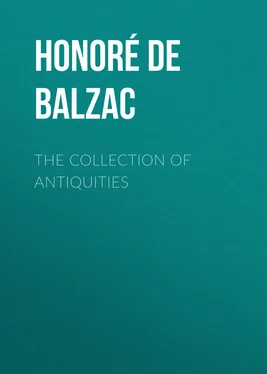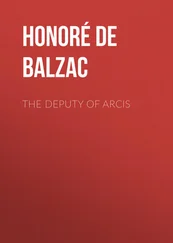Honoré Balzac - The Collection of Antiquities
Здесь есть возможность читать онлайн «Honoré Balzac - The Collection of Antiquities» — ознакомительный отрывок электронной книги совершенно бесплатно, а после прочтения отрывка купить полную версию. В некоторых случаях можно слушать аудио, скачать через торрент в формате fb2 и присутствует краткое содержание. Жанр: literature_19, foreign_antique, foreign_prose, на английском языке. Описание произведения, (предисловие) а так же отзывы посетителей доступны на портале библиотеки ЛибКат.
- Название:The Collection of Antiquities
- Автор:
- Жанр:
- Год:неизвестен
- ISBN:нет данных
- Рейтинг книги:5 / 5. Голосов: 1
-
Избранное:Добавить в избранное
- Отзывы:
-
Ваша оценка:
- 100
- 1
- 2
- 3
- 4
- 5
The Collection of Antiquities: краткое содержание, описание и аннотация
Предлагаем к чтению аннотацию, описание, краткое содержание или предисловие (зависит от того, что написал сам автор книги «The Collection of Antiquities»). Если вы не нашли необходимую информацию о книге — напишите в комментариях, мы постараемся отыскать её.
The Collection of Antiquities — читать онлайн ознакомительный отрывок
Ниже представлен текст книги, разбитый по страницам. Система сохранения места последней прочитанной страницы, позволяет с удобством читать онлайн бесплатно книгу «The Collection of Antiquities», без необходимости каждый раз заново искать на чём Вы остановились. Поставьте закладку, и сможете в любой момент перейти на страницу, на которой закончили чтение.
Интервал:
Закладка:
What a bit of luck to find something by way of proof of their assertions! President du Ronceret, and the public prosecutor likewise, lent themselves admirably, so far as was compatible with their duty as magistrates, to the design of letting off the offender as easily as possible; indeed, they went deliberately out of their way to do this, well pleased to raise a Liberal clamor against their overlarge concessions. And so, while seeming to serve the interests of the d’Esgrignons, they stirred up feeling against them. The treacherous de Ronceret had it in his mind to pose as incorruptible at the right moment over some serious charge, with public opinion to back him up. The young Count’s worst tendencies, moreover, were insidiously encouraged by two or three young men who followed in his train, paid court to him, won his favor, and flattered and obeyed him, with a view to confirming his belief in a noble’s supremacy; and all this at a time when a noble’s one chance of preserving his power lay in using it with the utmost discretion for half a century to come.
Du Croisier hoped to reduce the d’Esgrignons to the last extremity of poverty; he hoped to see their castle demolished, and their lands sold piecemeal by auction, through the follies which this harebrained boy was pretty certain to commit. This was as far as he went; he did not think, with President du Ronceret, that Victurnien was likely to give justice another kind of hold upon him. Both men found an ally for their schemes of revenge in Victurnien’s overweening vanity and love of pleasure. President du Ronceret’s son, a lad of seventeen, was admirably fitted for the part of instigator. He was one of the Count’s companions, a new kind of spy in du Croisier’s pay; du Croisier taught him his lesson, set him to track down the noble and beautiful boy through his better qualities, and sardonically prompted him to encourage his victim in his worst faults. Fabien du Ronceret was a sophisticated youth, to whom such a mystification was attractive; he had precisely the keen brain and envious nature which finds in such a pursuit as this the absorbing amusement which a man of an ingenious turn lacks in the provinces.
In three years, between the ages of eighteen and one-and-twenty, Victurnien cost poor Chesnel nearly eighty thousand francs! And this without the knowledge of Mlle. Armande or the Marquis. More than half of the money had been spent in buying off lawsuits; the lad’s extravagance had squandered the rest. Of the Marquis’ income of ten thousand livres, five thousand were necessary for the housekeeping; two thousand more represented Mlle. Armande’s allowance (parsimonious though she was) and the Marquis’ expenses. The handsome young heir-presumptive, therefore, had not a hundred louis to spend. And what sort of figure can a man make on two thousand livres? Victurnien’s tailor’s bills alone absorbed his whole allowance. He had his linen, his clothes, gloves, and perfumery from Paris. He wanted a good English saddle-horse, a tilbury, and a second horse. M. du Croisier had a tilbury and a thoroughbred. Was the bourgeoisie to cut out the noblesse? Then, the young Count must have a man in the d’Esgrignon livery. He prided himself on setting the fashion among young men in the town and the department; he entered that world of luxuries and fancies which suit youth and good looks and wit so well. Chesnel paid for it all, not without using, like ancient parliaments, the right of protest, albeit he spoke with angelic kindness.
“What a pity it is that so good a man should be so tiresome!” Victurnien would say to himself every time that the notary staunched some wound in his purse.
Chesnel had been left a widower, and childless; he had taken his old master’s son to fill the void in his heart. It was a pleasure to him to watch the lad driving up the High Street, perched aloft on the box-seat of the tilbury, whip in hand, and a rose in his button-hole, handsome, well turned out, envied by every one.
Pressing need would bring Victurnien with uneasy eyes and coaxing manner, but steady voice, to the modest house in the Rue du Bercail; there had been losses at cards at the Troisvilles, or the Duc de Verneuil’s, or the prefecture, or the receiver-general’s, and the Count had come to his providence, the notary. He had only to show himself to carry the day.
“Well, what is it, M. le Comte? What has happened?” the old man would ask, with a tremor in his voice.
On great occasions Victurnien would sit down, assume a melancholy, pensive expression, and submit with little coquetries of voice and gesture to be questioned. Then when he had thoroughly roused the old man’s fears (for Chesnel was beginning to fear how such a course of extravagance would end), he would own up to a peccadillo which a bill for a thousand francs would absolve. Chesnel possessed a private income of some twelve thousand livres, but the fund was not inexhaustible. The eighty thousand francs thus squandered represented his savings, accumulated for the day when the Marquis should send his son to Paris, or open negotiations for a wealthy marriage.
Chesnel was clear-sighted so long as Victurnien was not there before him. One by one he lost the illusions which the Marquis and his sister still fondly cherished. He saw that the young fellow could not be depended upon in the least, and wished to see him married to some modest, sensible girl of good birth, wondering within himself how a young man could mean so well and do so ill, for he made promises one day only to break them all on the next.
But there is never any good to be expected of young men who confess their sins and repent, and straightway fall into them again. A man of strong character only confesses his faults to himself, and punishes himself for them; as for the weak, they drop back into the old ruts when they find that the bank is too steep to climb. The springs of pride which lie in a great man’s secret soul had been slackened in Victurnien. With such guardians as he had, such company as he kept, such a life as he led, he had suddenly became an enervated voluptuary at that turning-point in his life when a man most stands in need of the harsh discipline of misfortune and adversity which formed a Prince Eugene, a Frederick II., a Napoleon. Chesnel saw that Victurnien possessed that uncontrollable appetite for enjoyments which should be the prerogative of men endowed with giant powers; the men who feel the need of counterbalancing their gigantic labors by pleasures which bring one-sided mortals to the pit.
At times the good man stood aghast; then, again, some profound sally, some sign of the lad’s remarkable range of intellect, would reassure him. He would say, as the Marquis said at the rumor of some escapade, “Boys will be boys.” Chesnel had spoken to the Chevalier, lamenting the young lord’s propensity for getting into debt; but the Chevalier manipulated his pinch of snuff, and listened with a smile of amusement.
“My dear Chesnel, just explain to me what a national debt is,” he answered. “If France has debts, egad! why should not Victurnien have debts? At this time and at all times princes have debts, every gentleman has debts. Perhaps you would rather that Victurnien should bring you his savings? – Do you know that our great Richelieu (not the Cardinal, a pitiful fellow that put nobles to death, but the Marechal), do you know what he did once when his grandson the Prince de Chinon, the last of the line, let him see that he had not spent his pocket-money at the University?”
“No, M. le Chevalier.”
“Oh, well; he flung the purse out of the window to a sweeper in the courtyard, and said to his grandson, ‘Then they do not teach you to be a prince here?’”
Chesnel bent his head and made no answer. But that night, as he lay awake, he thought that such doctrines as these were fatal in times when there was one law for everybody, and foresaw the first beginnings of the ruin of the d’Esgrignons.
Читать дальшеИнтервал:
Закладка:
Похожие книги на «The Collection of Antiquities»
Представляем Вашему вниманию похожие книги на «The Collection of Antiquities» списком для выбора. Мы отобрали схожую по названию и смыслу литературу в надежде предоставить читателям больше вариантов отыскать новые, интересные, ещё непрочитанные произведения.
Обсуждение, отзывы о книге «The Collection of Antiquities» и просто собственные мнения читателей. Оставьте ваши комментарии, напишите, что Вы думаете о произведении, его смысле или главных героях. Укажите что конкретно понравилось, а что нет, и почему Вы так считаете.












